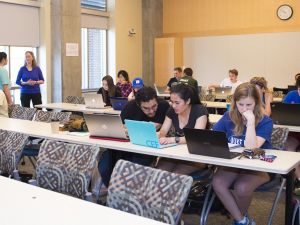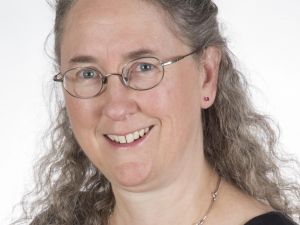Students in the Class of 2027 participated in the Halfway There Celebration on Abele Quad after declaring their majors. Sponsored by Sophomore Spark, a signature program through QuadEx, Halfway There is an annual event to recognize the accomplishments of the current sophomore class and celebrate the halfway point of their Duke undergraduate experience. Trinity College of Arts & Sciences is home to 35 departments and programs across arts, humanities, social sciences and natural sciences. Approximately 80% of Duke’s… read more about Computer Science Sophomores Declare They Are Halfway There »
Twenty four hours full of brainstorming, debugging, and caffeine. Coders of all skill levels came together from February 8-9 to participate in the Code for Good hackathon, an annual event hosted by student organization HackDuke. Fueled by pizza and energy drinks, teams of up to four vie for the chance to win prizes ranging from LEGO sets to Apple Watches. Most projects fell into one or more of the four tracks: Health, Finance, Sustainability, and Interactive Media. read more about You Don’t Have to Be a Hacker to Make an Impact in This 24-Hour Coding Sprint »
The Apple Scholars in AIML PhD fellowship program supports emerging leaders in academic research through funding as they pursue their PhDs, mentorship with Apple researchers, and internship opportunities. Scholars are nominated by their universities and are selected for the program based on their innovative research, leadership, and commitment to advancing their fields.Now in its sixth year, the fellowship program has supported more than 100 emerging leaders in computer science and engineering at the graduate and… read more about Two Ph.D. Students Announced as 2025 Apple Scholars in AIML »
An ambitious project led by Vanderbilt University Medical Center investigators aims to use artificial intelligence technologies to generate antibody therapies against any antigen target of interest. VUMC has been awarded up to $30 million from the Advanced Research Projects Agency for Health (ARPA-H) to build a massive antibody-antigen atlas, develop AI-based algorithms to engineer antigen-specific antibodies, and apply the AI technology to identify and develop potential therapeutic antibodies. ARPA-H is an agency… read more about Duke CS Alum Leads Group Developing AI Technology for Therapeutic Antibody Discovery »
At the crossroads of health care and technology, two leaders at Duke are not just driving innovation, they are ensuring that it is accessible and fair for all. Michael Pencina, a biostatistics and bioinformatics professor focusing on AI’s impact on health care, and computer science professor Nicki Washington, championing inclusivity in computer science education, share a core belief: Progress in AI and technology holds value when it benefits everyone. Pencina, director of Duke AI Health, emphasizes the… read more about Making AI More Ethical at Duke »
Four Duke CS students were honored by the Computing Research Association (CRA) for Outstanding Undergraduate Research in 2024-2025. The Outstanding Undergraduate Researcher Award program recognizes undergraduate students in North American colleges and universities who show outstanding research potential in an area of computing research. The award is made possible through the generous support of Sandia National Laboratories and Lawrence Berkeley National Laboratory (LBNL).FinalistHarry… read more about Duke CS Students Honored by 2025 CRA Outstanding Undergraduate Research Awards »
A Mathemalchemy: An Adventure in Math and Art exhibit. Duke's Department of Computer Science, along with the Department of Electrical and Computer Engineering, hosted a unique "insider access" exhibition and reception on Thursday, October 17, for ”Mathemalchemy: An Adventure in Math and Art” at MoMath, the National Museum of Mathematics in New York City.James B. Duke Distinguished Professor Emeritus of Mathematics Ingrid Daubechies, co-creator of the exhibit who The New York… read more about Duke Alumni and Friends Experience Mathemalchemy: An Adventure in Math and Art at National Museum of Mathematics »
Cells rely on complex molecular machinery to perform essential functions such as energy production and protein synthesis. To understand how these molecular machines impact health and disease, scientists can study their organization by using state-of-the-art cryo-electron tomography (cryo-ET) technology to acquire high-resolution images of native cellular landscapes. This approach is exciting because it allows researchers to directly observe how and where proteins interact with each other within the cell.However, locating… read more about Uncovering Molecular Patterns Using AI »
As the need for talented innovators in the field of computing grows, cultivating a robust and diverse workforce becomes increasingly essential. Co-chaired by Susan Rodger, professor of the practice of Computer Science, the Computing Research Association’s Committee on Widening Participation (CRA-WP) addresses this need. CRA-WP is one of several National Science Foundation (NSF) Broadening Participation in Computing (BPC) Alliances that receive funding as part of a key initiative aimed at… read more about Computing Research Association’s Committee on Widening Participation Receives $5.2 Million Investment from National Science Foundation »
read more about Duke experts discuss the potential of AI to help prevent, detect and treat disease »
In the culmination of an academic career spanning nearly 29 years, Professor Alvin ‘Alvy’ R. Lebeck retired from Duke University at the end of September. Lebeck, who holds a primary appointment in the Department of Computer Science and a secondary appointment in Electrical and Computer Engineering, is an innovator in computer architecture and systems. Lebeck’s research employs a combination of interdisciplinary and conventional research methods, with a foundation in computer architecture and systems. His… read more about Professor Alvin ‘Alvy’ R. Lebeck Retires After Nearly 29 Years at Duke »
Combining a tool she loves and a topic she cares about, Assistant Professor Monica Agrawal uses computational methodologies to study the multiple scales of human health. read more about Monica Agrawal Uses Computational Methodologies to Study Human Health »
Assistant Professor of the Practice Eric Fouh looks at computer science education though a particularly human angle: emotional self-regulation and the role it plays on learning. read more about Eric Fouh Is Bringing Self-Regulation to Computer Science Education »
Michael Reiter, James B. Duke Distinguished Professor of Computer Science and Electrical & Computer Engineering, was the recipient of the 2024 Lasting Research Award from the Association for Computing Machinery Conference on Data and Application Security and Privacy (ACM CODASPY). Reiter’s research focuses on computer and communications security, fault-tolerant distributed computing and applied cryptography. The award recognizes his work on “vulnerability detection in systems, applications and machine learning models,… read more about Reiter Recognized for his Work on Computer Security and Privacy »
Duke Computer Science's Theory Group members are honored to have eight papers accepted at the January 2024 ACM-SIAM Symposium on Discrete Algorithms (SODA) conference, with six of the Duke CS papers co-written by our graduate students. Read a brief summary of one of these papers, "Fair Price Discrimination," below. Imagine a scenario where a seller is selling copies of an item, like tickets to a museum or copies of a computer software. Each buyer can potentially value the item… read more about New Research with Machine Learning Tools Helps Determine "Fair Price Discrimination" »
Duke Computer Science's Theory Group members are honored to have eight papers accepted at the January 2024 ACM-SIAM Symposium on Discrete Algorithms (SODA) conference, with six of the Duke CS papers co-written by our graduate students. Read a brief summary of one of these papers, "Beyond the Quadratic Time Barrier for Network Unreliability," below. The unreliability of a network, defined as the probability that it disconnects under random (and independent) connection failures,… read more about New Research Goes "Beyond the Quadratic Time Barrier" »






























